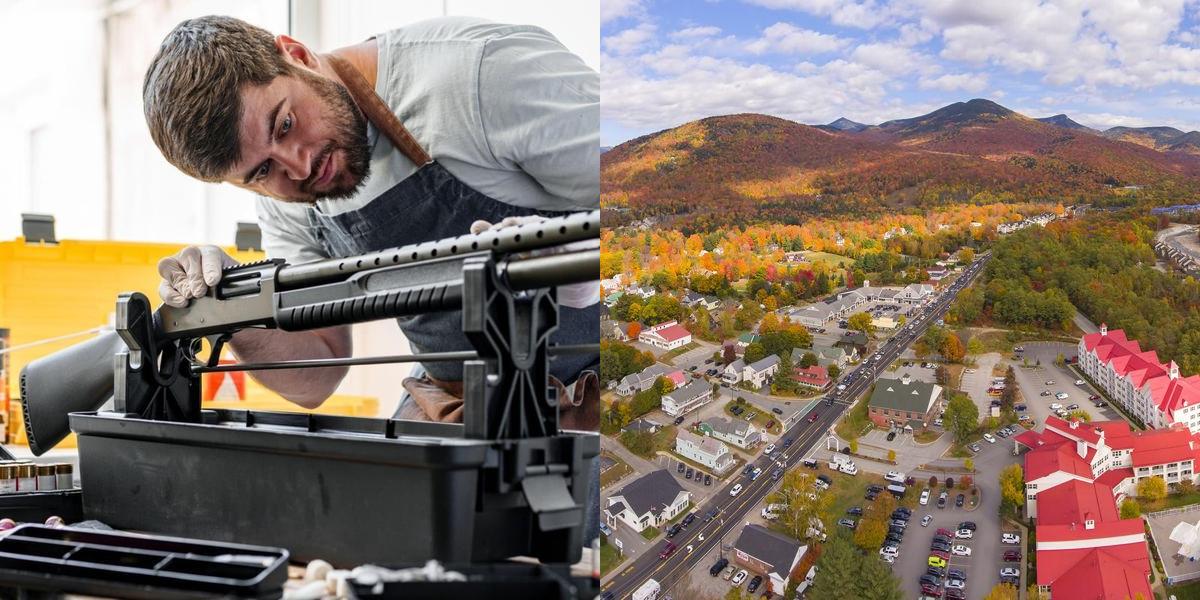How to Become a Gunsmith in New Hampshire

Gunsmiths are skilled professionals who repair, modify, and build firearms. They work with various types of guns, including rifles, shotguns, and handguns. Gunsmiths are responsible for ensuring that firearms are safe, functional, and accurate.
Key Points
- Gunsmiths repair, customize, and maintain firearms.
- They can be employed in gun shops, manufacturing facilities, shooting ranges, or operate independently.
- While not always mandatory, formal training in gunsmithing is highly beneficial.
- A Federal Firearms License (FFL) is required to legally work on firearms in the U.S.
- According to the U.S. Bureau of Labor Statistics, the average annual wage for gunsmiths in the U.S. is $49,830, or $23.96 per hour.
How Long Does It Take to Become a Gunsmith?
The length of time it takes to become a certified gunsmith can vary depending on the training program you choose. Generally, gunsmith programs can range from a few months to two years. The duration of the program will depend on factors such as the depth of the curriculum, the number of hands-on training hours, and whether the program is part-time or full-time.
While some shorter programs may focus on specific aspects of being a gunsmith, such as firearm repair or customization, longer programs typically offer a more comprehensive education that covers a wider range of topics. These longer programs may also include an apprenticeship component, allowing students to gain real-world experience under the guidance of experienced gunsmiths.
How Do I Get My Gunsmith Certification?
To become a certified Gunsmith, there are several steps you need to follow:
- Education: The first step in becoming a Gunsmith is to acquire the necessary education and training. There are several schools and training programs across the country that offer Gunsmithing courses. These programs typically cover topics such as firearm safety, basic gun repair, stock fitting, metalworking, and ballistics. It is important to choose a program that is accredited and recognized by the industry.
One notable school that offers Gunsmithing programs is the American Gunsmithing Institute (AGI). AGI offers a comprehensive Gunsmithing course that can be completed online or through a combination of online and hands-on training. This program covers all aspects of Gunsmithing and provides students with the knowledge and skills needed to become a certified Gunsmith.
-
Hands-on Training: In addition to formal education, gaining hands-on experience is crucial to becoming a skilled Gunsmith. Many Gunsmithing schools offer workshops and apprenticeship programs where students can gain practical experience under the guidance of experienced professionals. Taking advantage of these opportunities will not only enhance your skills but also provide you with valuable industry connections.
-
Obtain a Federal Firearms License (FFL): To work as a Gunsmith, you will need to obtain a Federal Firearms License (FFL) from the Bureau of Alcohol, Tobacco, Firearms, and Explosives (ATF). The FFL allows you to legally engage in the business of repairing, modifying, and selling firearms. The application process for an FFL can be complex, so it is advisable to seek guidance from experienced Gunsmiths or legal professionals.
-
Pass a Certification Exam: Once you have completed your education and obtained your FFL, you may choose to take a certification exam to further enhance your credentials. The National Rifle Association (NRA) offers a Gunsmithing certification program that consists of a written exam and a practical skills test. This certification can help you stand out in the job market and demonstrate your expertise as a Gunsmith.
Career Paths and Opportunities
Becoming a certified gunsmith opens doors to various career opportunities:
- Gunsmith Shop Owner: Operate your own business, offering repair and customization services.
- Firearms Manufacturer Employee: Work in the production and assembly of firearms.
- Gunsmith Instructor: Teach aspiring gunsmiths in educational institutions.
- Specialized Gunsmith: Focus on niche areas like antique restoration or competitive shooting modifications.
- Gunsmithing Consultant: Provide expert advice to individuals or businesses on firearm-related matters.
Gunsmith Salary Expectations
According to the U.S. Bureau of Labor Statistics, the average annual wage for gunsmiths in the U.S. is $49,830, or $23.96 per hour. Salaries can vary based on experience, location, and specialization. For instance, gunsmiths working in specialized custom shops or those with extensive experience may command higher wages.
Frequently Asked Questions
Q: Is formal education required to become a gunsmith?
A: While not always mandatory, formal training can provide valuable skills and improve job prospects.
Q: How long does it take to become a gunsmith?
A: Gunsmithing programs can range from a few months to two years, depending on the depth and type of training.
Q: Do I need a license to work as a gunsmith in New Hampshire?
A: Yes, obtaining a Federal Firearms License (FFL) from the ATF is required to legally work on firearms.
Final Thoughts
Pursuing a career as a gunsmith in New Hampshire offers a blend of craftsmanship, technical skill, and passion for firearms. With the right training and dedication, you can build a rewarding career in this specialized field.
Wondering if there's more? Perhaps these other articles will be more helpful if this one isn't exactly what you're after:

Athena is Co-founder and CEO of Dreambound.




